Montenegro
 Apparently, rich people are very bored. And when they’re not bored, they’re panicked. What are they panicked about, though? From the way the current economic meltdown is going, the wealthy are going out of their way not to spend money so as not to look like they’re wealthy — suggesting there’s not much pride in having money. The other thing they seemed to be panicked about is losing all their money. But why, if they’re ashamed, bored and scared, do they want to remain rich?
Apparently, rich people are very bored. And when they’re not bored, they’re panicked. What are they panicked about, though? From the way the current economic meltdown is going, the wealthy are going out of their way not to spend money so as not to look like they’re wealthy — suggesting there’s not much pride in having money. The other thing they seemed to be panicked about is losing all their money. But why, if they’re ashamed, bored and scared, do they want to remain rich?
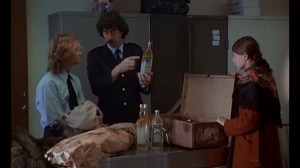 Mass entertainment is of no help in these matters. After seeing the 1996 adaptation of Henry James’ The Portrait of a Lady (starring Nicole Kidman and John Malkovich), I completely swore off taking in anything about rich people and their problems. And then there’s Edith Wharton, who wrote The Age of Innocence and The House of Mirth, trying to make us care about the delicate behavior of the wealthy, despite the fact that our sympathies are likely to be elsewhere. If you don’t think these authors are relevant enough, less than a year ago The Company Men was released. Ben Affleck, Tommy Lee Jones and Chris Cooper lose their high paying corporate jobs and have to learn about themselves for about a year, only to find new jobs before things get too bad. So it’s like they went on a paid vacation, complete with unemployment and severance checks.
Mass entertainment is of no help in these matters. After seeing the 1996 adaptation of Henry James’ The Portrait of a Lady (starring Nicole Kidman and John Malkovich), I completely swore off taking in anything about rich people and their problems. And then there’s Edith Wharton, who wrote The Age of Innocence and The House of Mirth, trying to make us care about the delicate behavior of the wealthy, despite the fact that our sympathies are likely to be elsewhere. If you don’t think these authors are relevant enough, less than a year ago The Company Men was released. Ben Affleck, Tommy Lee Jones and Chris Cooper lose their high paying corporate jobs and have to learn about themselves for about a year, only to find new jobs before things get too bad. So it’s like they went on a paid vacation, complete with unemployment and severance checks.
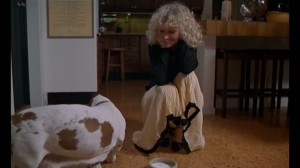 Dusan Makavejev’s Montenegro handles the dilemmas of the rich in what appears to be the standard way at first. Susan Anspach, the trophy wife of a much older Swedish salesman (played by Erland Josephson), can’t get her husband to pay any attention to her anymore. Does he think she’s used up, well past her expiration date? Well, it’s never made clear. However, when she disappears for a few days, he at first worries about her being kidnapped. Then the next morning at breakfast, with a sense of relief, he says to his two young children that “It’s much quieter here without your mother.” When Anspach finally does call Josephson, he seems more worried about whether or not the kidnappers will “take a check.” Now he’s not cash poor. It’s quickly established that he sold $7 million worth of his wares in the previous year. And there’s another scene where he tries to undercut* an already negotiated rate for an animal until Anspach insists he pay the amount the Yugoslavian dealer is asking.
Dusan Makavejev’s Montenegro handles the dilemmas of the rich in what appears to be the standard way at first. Susan Anspach, the trophy wife of a much older Swedish salesman (played by Erland Josephson), can’t get her husband to pay any attention to her anymore. Does he think she’s used up, well past her expiration date? Well, it’s never made clear. However, when she disappears for a few days, he at first worries about her being kidnapped. Then the next morning at breakfast, with a sense of relief, he says to his two young children that “It’s much quieter here without your mother.” When Anspach finally does call Josephson, he seems more worried about whether or not the kidnappers will “take a check.” Now he’s not cash poor. It’s quickly established that he sold $7 million worth of his wares in the previous year. And there’s another scene where he tries to undercut* an already negotiated rate for an animal until Anspach insists he pay the amount the Yugoslavian dealer is asking.
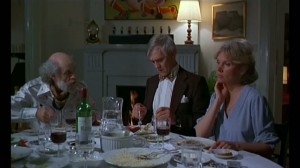 There’s a third example, as well. But then we get into how Makajevev approaches the material. At first it looks like he’s playing it straight, at odds with the surrealist satire** and boundary pushing of his other famous films (Sweet Movie and WR: Mysteries of the Organism). There are echoes of other films, but they are played a lot more passively — such as the opening scene which follows the pattern of the very rich attending a formal event, oblivious to the obnoxiousness of it all. There’s a punchline to the scene in Sweet Movie (which takes place at a bizarre beauty pageant), but not in Montenegro. Anspach is just attending another in a long line of boring social functions. You’d think the film were being told from Anspach’s perspective, but Makajevev does an interesting thing by cutting to animals, like a dog or a monkey, in the room with these rich people. The animals are judging them for their decadence, even with just a look. And when Josephson tries to get some help for his wife from a psychiatrist whom a friend of his recommends,*** Josephson has a brief disagreement with the psychiatrist’s secretary over a payment he doesn’t think he has to make. She insists he has to pay: “My boss wants you to know that he’s only interested in money.” That makes it seem like we’re now seeing the world from Josephson’s perspective, as he’s always under the impression that people are always trying to take his money away from him.
There’s a third example, as well. But then we get into how Makajevev approaches the material. At first it looks like he’s playing it straight, at odds with the surrealist satire** and boundary pushing of his other famous films (Sweet Movie and WR: Mysteries of the Organism). There are echoes of other films, but they are played a lot more passively — such as the opening scene which follows the pattern of the very rich attending a formal event, oblivious to the obnoxiousness of it all. There’s a punchline to the scene in Sweet Movie (which takes place at a bizarre beauty pageant), but not in Montenegro. Anspach is just attending another in a long line of boring social functions. You’d think the film were being told from Anspach’s perspective, but Makajevev does an interesting thing by cutting to animals, like a dog or a monkey, in the room with these rich people. The animals are judging them for their decadence, even with just a look. And when Josephson tries to get some help for his wife from a psychiatrist whom a friend of his recommends,*** Josephson has a brief disagreement with the psychiatrist’s secretary over a payment he doesn’t think he has to make. She insists he has to pay: “My boss wants you to know that he’s only interested in money.” That makes it seem like we’re now seeing the world from Josephson’s perspective, as he’s always under the impression that people are always trying to take his money away from him.
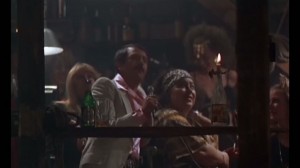 But are all these distractions what Makajevev was going for? Surely, as with his other films, there’s some deeper political point to be made — not just a standard story of a woman re-discovering her youth through being embraced by the poor immigrants before she returns to her marriage, wiser and emotionally richer. Only the final few moments hint at any sort of commentary. It’s sort of a combination of Luis Bunuel’s The Discreet Charm of the Bourgeoisie and Marco Ferreri’s La Grande Bouffe (where, over a long weekend, a couple of rich guys deliberately eat and screw themselves to death). But Montenegro is less coherent; especially because it is so at odds with the previous 90 minutes of the movie. Yes, most of Montenegro is deceptive, Anspach doesn’t even meet the life-changing Yugoslavians until halfway through the film and the comedic shifts are more whimsical than shocking (“You have a sheep in your car”). And with the status of Yugoslavians in Sweden (in 1981, when Montenegro was made) as the standard recent immigrants who the locals resent and have had to migrate to their own version of a shantytown, not to mention the fact that Makajevev is Yugoslavian, suggests that Anspach’s envelopment in their decadence is not about her using them for a spiritual awakening. If anything, Montenegro is about Anspach learning that she doesn’t really belong in either social group, and the symbolic and literal fireworks that occur after her most intimate experiences are meant ironically. At least I hope they were meant ironically. The final scenes in Montenegro leave me as conflicted as Anspach’s character.
But are all these distractions what Makajevev was going for? Surely, as with his other films, there’s some deeper political point to be made — not just a standard story of a woman re-discovering her youth through being embraced by the poor immigrants before she returns to her marriage, wiser and emotionally richer. Only the final few moments hint at any sort of commentary. It’s sort of a combination of Luis Bunuel’s The Discreet Charm of the Bourgeoisie and Marco Ferreri’s La Grande Bouffe (where, over a long weekend, a couple of rich guys deliberately eat and screw themselves to death). But Montenegro is less coherent; especially because it is so at odds with the previous 90 minutes of the movie. Yes, most of Montenegro is deceptive, Anspach doesn’t even meet the life-changing Yugoslavians until halfway through the film and the comedic shifts are more whimsical than shocking (“You have a sheep in your car”). And with the status of Yugoslavians in Sweden (in 1981, when Montenegro was made) as the standard recent immigrants who the locals resent and have had to migrate to their own version of a shantytown, not to mention the fact that Makajevev is Yugoslavian, suggests that Anspach’s envelopment in their decadence is not about her using them for a spiritual awakening. If anything, Montenegro is about Anspach learning that she doesn’t really belong in either social group, and the symbolic and literal fireworks that occur after her most intimate experiences are meant ironically. At least I hope they were meant ironically. The final scenes in Montenegro leave me as conflicted as Anspach’s character.
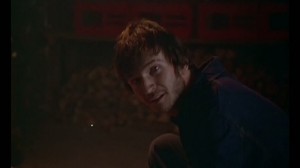 * It’s pretty clear we’re supposed to understand that the poor remain that way because they open their arms to strangers and celebrate their existence on a nightly basis with an extravagance that would be more associated with the rich.
* It’s pretty clear we’re supposed to understand that the poor remain that way because they open their arms to strangers and celebrate their existence on a nightly basis with an extravagance that would be more associated with the rich.
 ** The first half of Montenegro seems to be a parody of Ingmar Bergman films, where characters wallow instead of doing anything about their problems. It’s no accident that Makajevev cast Josephson as the husband, because Josephson was in a number of Bergman films — including as the husband in Scenes from a Marriage.
** The first half of Montenegro seems to be a parody of Ingmar Bergman films, where characters wallow instead of doing anything about their problems. It’s no accident that Makajevev cast Josephson as the husband, because Josephson was in a number of Bergman films — including as the husband in Scenes from a Marriage.
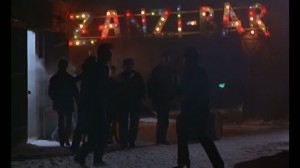 *** And has supposedly set up this meeting without the expectation of payment to the doctor.
*** And has supposedly set up this meeting without the expectation of payment to the doctor.



